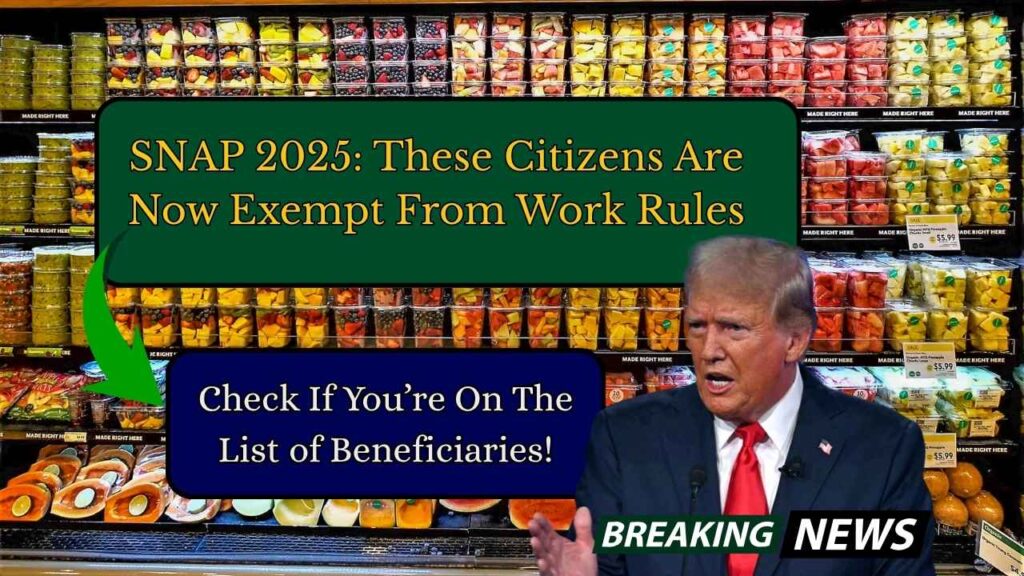SNAP 2025: These Citizens Are Now Exempt From Work Rules — Check If You’re On The List of Beneficiaries!
SNAP 2025– If you’re one of the millions relying on SNAP (Supplemental Nutrition Assistance Program) to put food on the table, 2025 just dropped some big updates. New exemptions from work requirements are now live—making it easier for certain citizens to keep benefits without jumping through bureaucratic hoops.

Wondering if you’re off the hook for mandatory job hunting or training hours? We’ll walk you through who qualifies, what’s changed, and how to claim your exemption—with real-life examples, a comparison chart, and pro tips.
SNAP 2025
| Key Info | Details |
|---|---|
| Who’s Affected | SNAP recipients aged 16–59 |
| Tougher Rules Age Band | 18–54 (ABAWD category) |
| New Exemptions | Veterans, homeless individuals, foster youth |
| Verification Needed | Yes – submit to SNAP office or online portal |
| State Waivers Still Active? | Yes – in several states and counties |
| Check Eligibility | USDA Official Work Rules |
2025 is a turning point for SNAP policy, finally recognizing that life’s barriers aren’t always visible on paper. Whether you’re a veteran, struggling with housing, or still piecing life together after foster care—this year, the system is built to support you.
Don’t assume the worst—check the new rules, claim your exemptions, and stay on top of your benefits.
What Are SNAP Work Requirements?
SNAP work requirements come in two flavors:
General Work Rules (16–59): Most adults must register for work, accept suitable offers, and not quit without cause.
ABAWD Rules (18–54): Able-bodied adults without dependents face a tougher rule—work 20+ hours/week or lose benefits after 3 months in 3 years.
But thanks to the Fiscal Responsibility Act of 2023, 2025 brings exemptions that reflect real-life struggles—especially for vulnerable populations.
New Exemptions for 2025: Who’s Now Free From SNAP Work Rules?
General Work Requirement Exemptions
You’re exempt if you:
- Work at least 30 hours/week
- Are pregnant or disabled
- Care for a child under 6
- Participate in drug or alcohol rehab
- Are a student enrolled half-time
- Already meet TANF or unemployment requirements
ABAWD-Specific Exemptions (New for 2025)
You’re also exempt from stricter ABAWD limits if you:
- Live with a child under 18
- Are a U.S. military veteran
- Are experiencing homelessness
- Are 24 or younger and were in foster care at 18
- Are medically or mentally unable to work
2024 vs 2025: What’s Changed?
| Category | 2024 Rules | 2025 Rules |
|---|---|---|
| ABAWD Age Range | 18–49 | 18–54 |
| Veteran Exemption | Not exempt | Now exempt |
| Homeless Exemption | Not exempt | Now exempt |
| Foster Youth Exemption | Not exempt | Now exempt |
| Work Hours | 20/week | Same |
| State Waivers | Some active | Still active in many states |
Real-Life Scenarios: Who Benefits from the New Rules?
Case 1: David, 52, Homeless in Seattle
David has no kids and was worried about losing SNAP under ABAWD rules. But because he’s experiencing homelessness, he’s now exempt.
Case 2: Jasmine, 23, Former Foster Youth
Jasmine aged out of foster care at 18. Even though she’s not working full-time, she keeps her SNAP benefits thanks to the 2025 update.
Case 3: Steve, 40, Army Veteran
Steve served for 12 years and now struggles with PTSD. Under 2024 rules, he needed to meet ABAWD requirements—but not anymore.
State-Specific Waivers: Are You in a “Safe Zone”?
Some states get waivers to suspend ABAWD rules in areas with high unemployment or low job availability. In 2025, these waivers are still active in:
- Alaska
- New Jersey
- New Mexico
- New York (excluding Saratoga County)
- Oregon
- South Dakota
- Rhode Island
- Washington
- Wisconsin
Check your eligibility on your state’s SNAP portal.
SNAP Exemption Checklist – Are You Covered?
Use this quick checklist for your SNAP interview or redetermination:
- Are you working 30+ hours/week?
- Are you pregnant or disabled?
- Caring for a child under 6?
- In alcohol/drug treatment?
- A military veteran?
- Homeless?
- Former foster youth under 24?
- Living with a minor?
- Attending school half-time?
- Living in a county with an active waiver?
If yes to any, you’re likely exempt—but still need to report it to your caseworker.
Tips for Navigating SNAP Interviews & Redeterminations
- Prep documents: medical letters, veteran forms, school records.
- Be honest but brief: clearly state your exemption type.
- Ask questions: confirm whether your exemption has been applied.
- Get it in writing: request a confirmation letter or email.
For Social Workers & Case Managers
If you’re a caseworker, veteran advocate, or community helper—here’s how you can support clients:
- Share printed exemption checklists
- Organize community workshops with local SNAP offices
- Help upload documents via state portals
- Educate clients about new ABAWD definitions
SNAP Benefits Can Help You Save Money During the Summer Holidays: Check How!
BREAKING: SNAP Benefits Hit $1,756 for Millions—How Much More Are You Getting?
FAQs About SNAP 2025
Q1: I’m 51 with no dependents. Am I now under ABAWD rules?
Yes—unless you’re exempt (veteran, homeless, disabled, etc.).
Q2: My county has a waiver. Do I still need to work?
Not under ABAWD rules—but you may still fall under general requirements.
Q3: I live with my sister’s kid. Am I exempt?
Yes. If a child under 18 lives with you, you’re off the ABAWD hook.
Q4: What if I already got a warning or cut-off?
You can reapply with updated exemption documents and request a case review.







